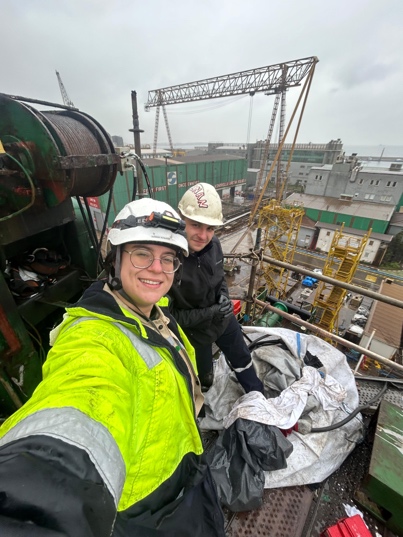A Conversation with the Göksu Kekeva, founder of Cisco Marine
How did you start in the maritime industry?
I studied industrial engineering, not something directly linked to shipping. But my university was in Tuzla, Istanbul close to shipyards, so I was surrounded by the maritime world. While working as a waiter at the campus café, a friend from a shipping agency mentioned they needed an intern. That was in 2018. Soon after, the pandemic hit, classes went online, and I began working full-time. Over time, I moved from intern to operations manager, finance manager, and later project manager. What began as a coincidence became my career path.
I started in agency, where the focus is on handling arrivals, documents, and formalities. Later, I shifted into technical service and repair. This combination gave me a unique advantage: I understood both sides. I could clear customs and manage regulations but also go onboard and carry out machine maintenance. As project manager, I also drew on my finance background, handling budgets and planning while staying close to operations. That mix, office knowledge plus hands-on ship experience, really set me apart.

What does Cisco Marine do today? Why is it important?
At Cisco Marine, we aim to be a one-stop service station for shipowners and operators. We provide technical services in electrical automation, hydraulic systems, and repair and maintenance across international ports, shipyards, and anchorage areas. Because we operate internationally, we can support vessels anywhere, finding the right team at the right time is often difficult, and our mission is to make that process seamless. Our greatest competitor is time. Every hour a ship is delayed matters. That’s why we focus on delivering the fastest, most practical, and most efficient solutions for our clients.
I lead Sales & Marketing but always integrate my work with operations. Before jobs, I focus on expanding client potential and building new opportunities, while execution is handled by other departments. Afterward, I analyze customer feedback and develop strategies to improve service quality. For me, it’s also important to stay close to the field. The real reality of shipping is on board the vessel, and I have great respect for seafarers.
What is your guiding principle at work?
Too often in this industry, success is measured by money or the size of a team. But for me, real success comes from transparency and honesty. Many firms cut corners or take shortcuts, but that doesn’t build something lasting. Our motto is “transparent business, visible solutions.” If something can’t be done, we say so and propose an alternative. That’s why customers return to us. I believe sustainable success is built on ethics and trust. We’ve walked away from deals and profits rather than compromise our integrity. It takes years to build a good name, but only minutes to lose it.
Every day in the field brings new challenges, and nothing ever goes exactly as planned. That unpredictability is the greatest lesson I’ve learned, and it keeps me focused on always having a backup plan. In this industry, success is less about “winning” and more about resilience, adaptability, and being prepared.
You can’t do this job without loving the sea and ships. For me, the sea is life, I couldn’t imagine living anywhere without it. The work can be tough, but we make it rewarding: celebrating birthdays in ship mess halls, catching beautiful views, or even sleeping on benches during long shifts. Those who don’t embrace the philosophy of the sea won’t last.
How do you handle safety which is critical in your work?
Safety is non-negotiable. Every technician on our team receives annual certifications, plus specialized training: electrical crews train in electrical safety, hydraulic teams in crane and working-at-heights protocols, and so on. From day one, every technician is fully equipped with PPE. If anything is lost or damaged, it’s immediately replaced, no questions asked. Safety isn’t optional; it’s part of our culture.
How are technology and data shaping the future of your work?
Shipping evolves more slowly than other industries. Every regulation must be applied globally, which makes adoption costly and complex. In ship repair, especially, we’re still far behind, almost in “stone age” conditions compared to logistics or automotive. Real integration of AI and automation will take decades, because it requires global standardization and large budgets. Until then, progress will be gradual. But in the future, digital platforms that connect owners, agents, and service providers will be essential.
Your thoughts on the role of women in maritime.
I believe women can be highly successful in maritime when placed in roles where they add the most value. Today, we see female inspectors, captains, and chief engineers, but their numbers are still far too low. What needs to change is not ships or machinery, but attitudes and behaviors. Achieving gender balance in our industry would add enormous strength and quality, not only for companies but also for our country.



